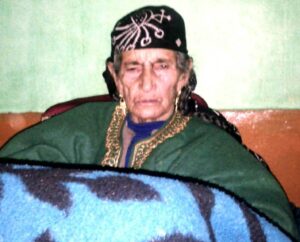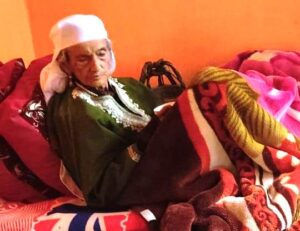Zeba Zeenat: The Bard of Kashmir’s Mystic World

Bisma Farooq is a Staff Writer at the Mountain Ink.
In the land of ‘Adab’, a venerable versifier is speaking hearts and minds of masses with her mystical verses.
In her meditatively-calm room, she’s murmuring the song of storms.
The song is a rendition of her verses woven with mystic musings. There’s an apparent throbbing heart in the melody transcending sensory perceptions. It talks about the significance of submission and the path frequenting by faithful on instructions of their masters and mentors.
The strife region celebrated as ‘Pir-i-vaer’—the valley of saints—isn’t new to this submissive notion of life. The practitioners of the Sufi way of life often tread this path, to seek and uphold what they call “the ultimate truth of life”.
She makes a passing mention of Mansur (al-hallāj) — the Persian poet condemned to death for shouting in ecstasy: Ana al-haqq, Ana al-haqq (I’m the Truth, I’m the Truth).
That mystic and teacher of Sufism climbed the gallows with his head held high, not the least daunted by his imminent death.
Support Our Journalism
You are reading this because you value quality and serious journalism.
But, serious journalism needs serious support. We need readers like you to support us and pay for making quality and independent journalism more vibrant.
Mansur’s path is the way of living and death for Sufis and the source of stanzas for Zeba Zeenat.
Zeba isn’t a routine poet’s profile. At touching 90, she’s just a musing devoid of memory. Settled on a mattress, her song is steadily getting loud and driving out the silence of the room.
In that reflective moment, she remembers her young version — the girl with a song at her heart. She guards that songster while everything else is fading in her musing mindscape.
That girl in her head belongs to the pre-partition period of Kashmir. In those tyrannical times, songs were quite rare, but the girl would sing them with her rebel heart.
Zeba remembers a garden now fattened with graves — where she would be encircled by her smiling friends eager for her festive songs of love and hope.
This picture of a young girl stands crystalized in Zeba’s amorphous mind memorial now.
“Nobody was there to ingrain the songs in me,” she whispers. “They just came to me.”
La Ilaha Illallah likhet chum seenas
Lah mea kormai ilmas te deenas
Kath mea baevnam panne peeran
Khyen khyen thovum dilkis neginas.
(Engraved in my heart is there’s no God but Allah
I gave up knowledge and religion
My mentor burnished vision in me
And laid the foundation of my faith.)
While the poet murmurs her poetry in a spent state, her room resonates with mystic vibes. In that transcendence, she maintains silence about her life’s defining moments making her Ded—matron—of different times.


Born in 1934 at Bandipora’s Nadihal area, Zeba was the youngest and the dearest among six siblings. Her songs flowed freely and would even uplift the spirit of happy occasions in her village.
“I used to sing while walking, working, playing and sometimes while sleeping,” she remembers the only vivid memory of her life.
Her melodious journey continued even after her marriage in Hajin’s Sufi family. Her in-laws would frequently host mystics. And that meditative atmosphere drifted her towards mysticism.
This was the time when Hajin—apart from its genius son Prof. Hajini—was known for its contribution in the field of Sufi poetry.
As Zeba’s songs became spiritual stanzas, the mother of seven children wanted to walk an extra mile on the Sufi path. But her mentor, Gulzar Hajini told her to first get her daughters married. She married all her daughters before starting her mystic journey.
But years later, when one of her daughters suddenly died in her late twenties, it would bring a different effect and expression to Zeba’s poetry.

Today, as a living Sufi poet of Kashmir, Zeba is seeking the “ultimate truth” — the essence of the Sufi poetry and spiritual verses, says Shabaz Hakbari, a Sufi poet-critic: “Her poems based on self-exploration sets her apart. And this self-exploration leads to the goal of ultimate truth.”
Many people after attaining the level where they come to know about the higher powers stop there and do not talk about it, but some people are blessed with the power to express themselves and become Sufi poets like Zeba, Shabaz says.
Yenas gasnas chune yate tchen
Tyate haraam araam bai khyen chen
(Arrival and departure is an endless circle here
While rest and feeding is forbidden there.)
The expression of these words, Shabaz says, delights everyone around them: “The poetry of Zeba fits into the folk-singing of Kashmir and it connects the heart to soul and soul to the body and a listener gets to know about life and existence.”
In her room, the poet passes blank looks, akin to those torn asunder by war. Back in the day when the hostilities engulfed her hometown, she saw friends becoming foes in a poetic perception.
In the face of those disgruntled voices and losses, she would quietly retire to her home to give voice to her poet.
“Zeba’s poetry is just like works of Naseem Shafaie and Shabnum Ashaie, who are the two famous poets of Kashmir,” Shabaz says.
“Both of these poets are well-qualified and hence have energy and strength in their works. Zeba has attained similar energy and strength due to the spiritual and Sufi path.”
Mountain Ink is now on Telegram. Subscribe here.
Become Our Ally
To help us strengthen the tradition of quality reading and writing, we need allies like YOU. Subscribe to us.













